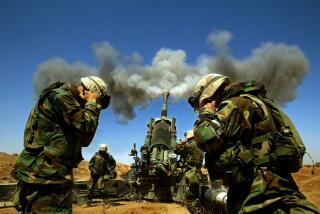Options Reduced to Bombing : Gulf crisis: Americans know the stakes, and they won’t support a ground offensive.
- Share via
By spending the Thanksgiving holiday with the troops, President Bush again emphasized the parallels with the epic conflict of his youth. Saddam Hussein is Hitler, Kuwait is 1939 Poland, Saudi Arabia is the besieged England of 1940, and he himself is the Churchill of the hour. In the meantime, key members of Congress who do not share his boyish enthusiasm have begun to act. In the Senate, the very powerful Sam Nunn is about to open the hearings of his very powerful Armed Services Committee, which has the determining voice in all major military decisions. In the House, the formidable Lee Hamilton will concurrently open the hearings of his Foreign Relations Committee--the same committee that blocked Ronald Reagan’s secret war against Nicaragua.
Neither Nunn nor Hamilton believes that Hussein should be allowed to have his way. Along with a majority in Congress, both are convinced that Iraqi military power must be demolished in one way or another. But Nunn and Hamilton are accurately reflecting the new mood in American public opinion in opposing a ground war that would cost thousands of American lives.
During the last 100 days of crisis, Americans have had the opportunity to find out what Kuwait was, what Saudi Arabia is and what America’s allies amount to. There are no street protests about the virtual absence of Japanese and European troops in Saudi Arabia (except for the quasi-symbolic British and French contingents), but the facts have registered well, and the loss of American lives to secure cheap oil mainly for Europeans and Japanese has become totally unacceptable to a growing majority of Americans.
The discovery that pre-invasion Kuwait was ruled by a small, greedy oligarchy, and that young Kuwaitis in Saudi Arabia are idling in luxury hotels while American women soldiers are preparing for war in the desert, has done its part in reducing enthusiasm for any costly liberation of Kuwait. As for Saudi Arabia, the widely reported episode of the women drivers and their punishment by order of a fanatical cleric, has greatly simplified exotic complexities. Whatever it is, Saudi Arabia clearly is not an embattled democracy. The more President Bush insists on treating Kuwaitis and Saudis as friends and allies whose welfare deserves the sacrifice of American lives, the more he diverges from American public opinion--and that, of course, is the leading cause of the huge drop in the President’s popularity as revealed by the polls.
What has not changed is the determination to destroy the power of Iraq, and the rejection of any diplomatic solution that would leave Hussein with any gains. Given the opposition to any war that would kill thousands of Americans, the equation could in theory be resolved in two quite different ways: indefinite continuation of the embargo, or the use of air power alone.
But the President has now closed the first option, which would have required two or three years to reduce the Iraqi economy to its indigenous state--without cars, electricity or anything else that depends on imports. It would have been hard to wait that long with 200,000 American troops in Saudi Arabia; with 400,000 men and women, including many reservists abruptly taken away from their families, it is quite impossible.
That leaves only bombardment--not a “surgical strike” but two or three weeks of air operations during which Iraqi military installations and supply columns would be bombed, photographed and bombed again--until the Iraqis in Kuwait are starved out and nothing remains of Saddam Hussein’s dreams of power.
If President Bush ignores public opinion and decides on a ground war in the absence of an Iraqi capitulation, and if the expected thousands are killed in the desert, even a total victory would not prevent his political destruction. That is what Nunn and Hamilton are now urgently telling him.
More to Read
Get the L.A. Times Politics newsletter
Deeply reported insights into legislation, politics and policy from Sacramento, Washington and beyond. In your inbox twice per week.
You may occasionally receive promotional content from the Los Angeles Times.










